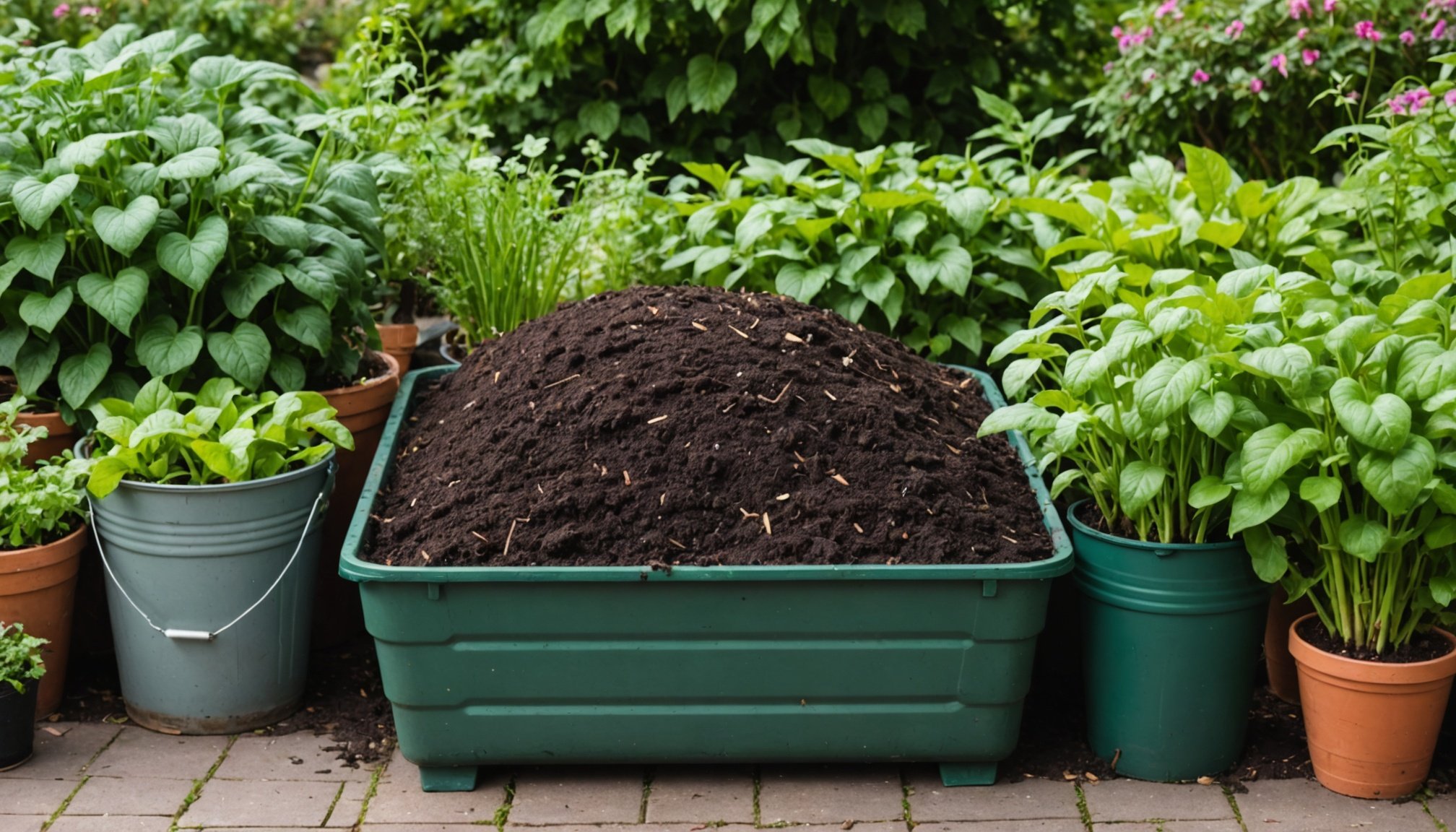Understanding Composting and Its Importance
Delving into composting basics, it’s essential to grasp how this natural process transforms organic waste into valuable soil amendments. At its core, composting encourages the decomposition of kitchen waste—such as vegetable scraps and coffee grounds—via microorganisms thriving in warm, moist conditions. This decomposition process results in nutrient-rich compost, often referred to as “black gold” by gardening enthusiasts.
The benefits of composting extend beyond individual gardens, playing a crucial role in the broader context of sustainable gardening. By diverting kitchen waste from landfills and turning it into compost, we significantly reduce methane emissions, a potent greenhouse gas. This contributes to a lower carbon footprint, showcasing one of the many environmental benefits of composting kitchen waste.
A lire également : Transform Your UK Coastal Front Yard into a Delicious Edible Garden: A Step-by-Step Guide
Furthermore, the benefits of composting manifest in soil health enhancement. Compost contributes essential nutrients, improving soil structure, water retention, and aeration. For home gardeners, this means healthier plants, better yields, and reduced reliance on chemical fertilisers. Thus, a commitment to composting not only supports ecological balance but also yields tangible benefits for your garden’s productivity.
In summary, understanding the composting basics and recognising its multifaceted benefits is pivotal for anyone looking to engage in environmentally friendly gardening practices.
Cela peut vous intéresser : Transform Your UK Garden into a Pest-Free Paradise: Essential Tips for Building a Balanced Ecosystem
Suitable Kitchen Waste for Composting
When diving into the world of composting, understanding the ideal kitchen waste materials is crucial. Let’s break down the components that make your compost thrive.
Green Materials
Green kitchen waste materials are rich in nitrogen, a vital nutrient for compost microorganisms. Fruit scraps such as banana skins and apple cores, along with vegetable peels like carrot tops and potato skins, are excellent choices. These ingredients decompose quickly, contributing to a rich, nutrient-filled compost.
Brown Materials
Balancing your green materials with brown materials is essential. They are high in carbon, helping to aerate the compost and prevent it from becoming too wet. Dry leaves collected from the garden and small pieces of cardboard are perfect brown materials. This balance ensures a healthy composting process.
What to Avoid
Not all kitchen waste materials are suitable for composting. Avoid adding dairy products, meat scraps, or oils to your compost pile, as they can attract pests and lead to unpleasant odours. Certain cardboard types, especially those with glossy print, should also be excluded to prevent chemical contamination. Steering clear of these items helps maintain an effective and hassle-free composting process.
Effective Composting Techniques for the UK Climate
Navigating the world of composting methods requires a good understanding of how each technique suits different environments. From compost bins to piles and tumblers, the options are varied. Compost bins offer a neat solution, keeping the organic waste contained and minimising odour. They are particularly useful in urban settings where space is limited. Compost piles, on the other hand, work well in larger gardens, providing a natural habitat for microorganisms that thrive in an open environment.
The UK climate adaptation plays a significant role in the effectiveness of these composting techniques. With its unique seasons, adjustments in moisture and aeration are necessary. During the wet, cooler months, turn your compost more frequently to maintain aeration and prevent the pile from becoming waterlogged. Conversely, during dry spells, keep the compost moist to ensure the microorganisms remain active and efficient.
Moisture control and proper aeration are critical elements in the composting process. A balance between the two facilitates the breakdown of organic matter, accelerating the transformation into nutrient-rich compost. Regularly turning the compost heap ensures good oxygen flow, while adding water helps maintain the ideal moisture level, preventing the compost from slowing down or becoming anaerobic.
Creating a Productive Compost Bin
Building compost bins is an art that thrives on smart choices and regular maintenance. A well-crafted composting system can significantly enhance your garden’s health, offering a sustainable way to recycle organic waste.
Choosing the Right Location
When setting up your compost bin, consider its placement carefully. The optimal location should ensure ample sunlight exposure for warmth, facilitating the decomposition process. Additionally, good drainage is crucial to prevent waterlogging and to maintain a balanced moisture level, avoiding any potential odours or undesirable anaerobic activity. Close proximity to your garden can also be beneficial for easy access and use of compost.
Types of Compost Bins
Selecting the appropriate compost system involves understanding the pros and cons of different types. Stationary bins are durable and ideal for large gardens but require manual turning. Tumbling bins offer convenience, facilitating easy aeration through rotation, yet they might not accommodate larger volumes. Worm bins, also known as vermiculture, are excellent for small spaces and indoor use, efficiently processing kitchen scraps into rich compost. Each type caters to different preferences and UK gardening needs, allowing you to find a perfect match for your composting ambitions.
Maintenance of the Compost Bin
For effective composting, regularly turn and aerate your compost to introduce oxygen, which accelerates decomposition. Monitoring temperature and moisture is key; a warm, slightly damp environment promotes microbial activity while preventing compost from drying out or becoming soggy. Keeping these elements balanced ensures a thriving compost bin, yielding nutrient-rich results.
Common Challenges in Composting and Solutions
Embarking on a composting journey often comes with its fair share of composting challenges. One of the most frequent issues faced is the presence of unpleasant odors. To tackle these odor issues, it’s crucial to maintain the right balance of green (nitrogen-rich) and brown (carbon-rich) materials. A well-balanced ratio prevents anaerobic conditions that lead to smells. Ensure your compost pile is turned regularly to encourage aeration, which will help dissipate any unwanted odours.
Pests can also pose significant challenges in composting. To keep them at bay, it’s important to cover food scraps with a layer of brown materials you’re troubleshooting your compost. This acts as a barrier, making the scraps less accessible and attractive to pests like rodents. In addition, use secure compost bins with tightly fitted lids to block pest entry.
Another common issue is slow decomposition, particularly in colder months. To promote decomposition, consider insulating your compost bin with straw or cardboard. This simple step helps retain heat and encourages microbial activity essential for breaking down materials. Alternatively, move the compost bin to a sunnier spot to harness natural warmth, speeding up the process. With these troubleshooting tips, maintaining a successful composting system becomes a manageable task.
Regulatory Considerations and Local Resources
When navigating UK composting regulations, understanding the specific rules is crucial. Each local authority may offer distinct guidelines to ensure safe and efficient composting practices in residential areas. Compliance is often centred around the correct management of waste and prevents issues like odour, pests, or the spread of pathogens.
One must familiarise themselves with these local variations to fully benefit from any legal benefits. For example, some councils might provide tax incentives or support schemes for households that demonstrate adeptness in waste reduction through composting. This can offer considerable legal benefits for composters who adhere to these practices.
To support composting efforts, numerous local composting resources are available. Community programs and initiatives can provide essential guidance on setting up at-home composting systems. Many local councils run workshops or offer discounted compost bins to encourage environmental responsibility.
Moreover, these local composting resources often foster a sense of community, enabling residents to share insights and encourage sustainable practices. Joining such initiatives not only enhances personal composting knowledge but strengthens community ties. Through interaction, individuals can access a wealth of information that transcends the basic requirements of the UK composting regulations, enriching their environmental consciousness.
Environmental Impact of Composting Kitchen Waste
Composting significantly contributes to environmental sustainability, offering myriad benefits. At the forefront is its role in reducing landfill waste. Kitchen waste, which comprises a substantial portion of household refuse, often ends up in landfills where it decomposes anaerobically, releasing methane—a potent greenhouse gas. By diverting kitchen scraps through composting, we can reduce these harmful emissions, diminishing our carbon footprint.
Moreover, composting enhances biodiversity and soil health. The process involves the natural decomposition of organic matter, which enriches the soil with nutrients. This, in turn, supports diverse microbial activity, fostering a thriving ecosystem underground. Healthy soils with rich biodiversity are more resilient to disease and promote healthier plant growth, which improves local flora and contributes to overall ecological balance.
In addition to these environmental benefits, composting has positive social implications when practiced on a community scale. Communities that adopt widespread composting can experience enhanced communal spaces, as improving soil quality can transform garden plots and public green areas. This fosters cooperation and shared responsibility while promoting awareness about sustainable practices. The communal effort can inspire collective action towards a more sustainable future, making composting not just an individual endeavor, but a community-driven movement towards environmental well-being.











